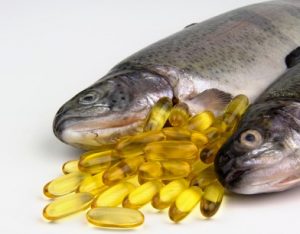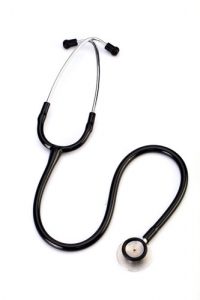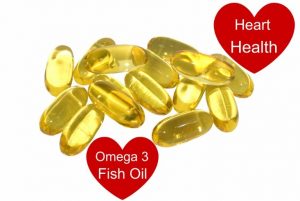Can You Get The Omega-3s You Need From Diet Alone?
Author: Dr. Stephen Chaney
 Two recent studies have provided strong evidence that omega-3s reduce the risk of heart attacks. However, both studies used high doses of omega-3s and did not do a dose-response analysis. That leaves you with several unanswered questions:
Two recent studies have provided strong evidence that omega-3s reduce the risk of heart attacks. However, both studies used high doses of omega-3s and did not do a dose-response analysis. That leaves you with several unanswered questions:
- How much omega-3s do you need to significantly reduce your risk of heart attack?
- Will that amount of omega-3s provide other health benefits?
- Can you get that amount of omega-3s from diet alone?
- Can you get that amount of omega-3s from supplementation alone?
Fortunately, a recent study (KH Jackson et al, Prostaglandins, Leukotrienes and Essential Amino Acids, 142: 4-10, 2019) has answered those questions. But, before we consider that article, we should look at a biomarker called “Omega-3 Index.”
What Is Omega-3 Index And Why Is It Important?
 The Omega-3 Index is a measure of the ratio between the heart-healthy omega-3 fats (EPA + DHA) and all the other fats in red blood cell membranes. It is considered an excellent measure of our omega-3 status.
The Omega-3 Index is a measure of the ratio between the heart-healthy omega-3 fats (EPA + DHA) and all the other fats in red blood cell membranes. It is considered an excellent measure of our omega-3 status.
Dr. William S Harris, one of the top experts in the omega-3 field, first proposed the Omega-3 Index as a biomarker for cardiac health back in 2007. Based on multiple clinical and population studies, he proposed that an Omega 3 Index of 4% was associated with high heart attack risk, and an Omega-3 Index of 8% was associated with low heart attack risk. This has been supported by a recent meta-analysis of 10 clinical studies showing that an Omega-3 Index of 8% was associated with a 35% reduction in cardiovascular death compared to an Omega-3 Index of 4%.
Other studies suggest that an Omega-3 Index of 8% is associated with:
- A slower rate of telomere shortening.
- A lower risk of death from any cause.
- Reduction in symptoms of depression.
- Improved recovery from a heart attack.
- Reduction in arthritis symptoms.
- Reduced age-related brain shrinkage in B-vitamin treated subjects. (I have written about the synergistic relationship between omega-3s and B vitamins with respect to brain health in a previous issue of “Health Tips From the Professor.”
(Note: You will find references to these studies in the paper I have cited.)
For reference, most Americans have an Omega-3 Index between 4 and 6%. In contrast, in Japan, where the incidence of heart disease is much lower, the Omega-3 Index ranges from 6.8% to 9%.
How Was The Study Designed?
 The data for this study were derived from 3458 individuals who 1) sent in a dried blood spot to a commercial laboratory for determination of Omega-3 Index between March 30, 2017 and January 15, 2018, 2) filled out a short questionnaire about fish intake and omega-3 supplement use, and 3) were older than 18.
The data for this study were derived from 3458 individuals who 1) sent in a dried blood spot to a commercial laboratory for determination of Omega-3 Index between March 30, 2017 and January 15, 2018, 2) filled out a short questionnaire about fish intake and omega-3 supplement use, and 3) were older than 18.
With respect to fish intake, the possible responses were “none per week,” “every other week,” “every week,” “2 times per week,” and “3 or more times per week.”
With respect to omega-3 supplement use, those who reported taking an omega-3 supplement were asked what kind of omega-3 supplement they were taking. Those who said they were taking a flaxseed oil supplement were excluded from the analysis because flaxseed oil contains no EPA or DHA.
The characteristics of the population studied were as follows:
- 84% came from the United States. The remaining 16% came from 27 other countries.
- The average age was 51 years and 40% of the respondents were male.
- 62% ate little or no fish. The exact breakdown of fish consumption was:
- 5% ate no fish.
- 9% ate fish every other week.
- 6% ate fish weekly.
- 2% ate fish twice a week.
- 8% ate fish three or more times a week.
- 52% took omega-3 supplements. Of those taking omega-3 supplements, 84% were taking fish oil supplements.
How Much Omega-3s Do You Need?
 The correlation between omega-3 intake and Omega-3 Index in these individuals was:
The correlation between omega-3 intake and Omega-3 Index in these individuals was:
- No fish = 4.5%.
- No fish + supplementation = 6.6%.
- Bi-weekly = 4.8%
- Bi-weekly + supplementation = 6.9%
- Weekly = 5.1%
- Weekly + supplementation = 7.3%
- Twice weekly = 5.7%
- Twice weekly + supplementation = 7.8%
- 3+ times per week = 6.5%
- 3+ times per week + supplementation = 8.6%
The authors said: “We found that those with the best chance of achieving a desirable Omega-3 Index were reporting the consumption of at least 3 fish meals per week and were taking an EPA + DHA-containing omega-3 supplement.”
The authors further concluded that an EPA + DHA intake of around 835 mg per day or higher would be required to achieve an average Omega-3 Index of 8%. This was based on two assumptions:
- A 4 once serving of oily fish provides around 1,200 mg of EPA + DHA.
- The average omega-3 supplement provides around 300 mg of EPA + DHA.
What Are The Limitations Of The Study?
The two biggest limitations of the study are the assumptions that a serving of fish provides 1,200 mg of EPA + DHA and a fish oil supplement provides 300 mg of EPA + DHA.
- Their dietary survey did not ask what kind of fish the respondents were consuming. Some fish provide much less than 1,200 mg of EPA + DHA per serving. This could have caused the authors to overestimate the contribution that fish intake made to the Omega-3 Index in their study.
- Some omega-3 supplements provide more than 300 mg EPA + DHA, and some people take more than the recommended number of omega-3 capsules. This could have caused the authors to underestimate the contribution of omega-3 supplements to the Omega-3 Index in their study.
The major implication of these limitations comes when we look at the standard deviation of the correlations between omega-3 intake and Omega-3 Index.
- Some people consuming 3 or more servings of fish per week had an Omega-3 Index of well above 8%. This suggests that diet alone can allow you to reach an optimal Omega-3 Index. This conclusion is also supported by dietary studies in Japan (see below).
- Some people taking omega-3 supplements had an omega-3 index of above 8% even in the group consuming no fish. This suggests that supplementation alone can allow you to reach an optimal Omega-3 Index as long as your total EPA + DHA intake is 835 mg/day or greater.
These limitations may also affect the calculation of how much EPA + DHA we need to reach an optimal Omega-3 Index. For example, the most widely used omega-3 calculator estimates that you would need 950 mg of EPA + DHA to increase your Omega-3 Index from 4% to 8%.
What Does This Study Mean For You?
 At the beginning of this article I said that this study answered 4 questions:
At the beginning of this article I said that this study answered 4 questions:
- How much omega-3s do you need to significantly reduce your risk of heart attack?
- This study estimated that around 835 mg/day of EPA + DHA is needed to reach an Omega-3 Index of 8%, which previous studies have shown to be associated with low heart disease risk.
- This is similar to the 950 mg/day estimate from a widely used omega-3 calculator.
- There is considerable individual variability, but 835 – 950 mg/day is a good target for most people. If in doubt, I recommend that you get your Omega-3 Index tested.
- Will that amount of omega-3s provide other health benefits?
- The evidence is strongest for heart health, but this paper lists other studies suggesting that a high Omega-3 Index is associated with reduced risk of depression, arthritis, age-related brain shrinkage & cognitive decline, and death from all causes.
- Can you get that amount of omega-3s from diet alone?
- In this study an optimal Omega-3 Index was achieved only in the group that consumed 3 or more servings of fish per week and took an omega-3 supplement. However, not all those fish were rich in EPA + DHA.
- Previous studies have shown that Japanese who consume 3 or more servings per week of oily fish, rich in EPA + DHA, have an Omega-3 Index of 6.8% to 9%. This shows us it is possible to reach an optimal Omega-3 Index from diet alone.
- Can you get that amount of omega-3s from supplementation alone?
- Here the answer is clearly yes. Based on this and other studies, it would require in the range of 835-950 mg/day from supplementation to reach an optimal Omega-3 Index for most people.
Here are some other conclusions from the authors of the study:
- “The average Omega3 Index in Japan ranges from 6.8 to 9.0%…So, yes, an Omega-3 Index of >8% is achievable by diet alone. But Japan is fairly unique…The average Omega-3 Index for Americans ranges from 4 to 6%. So, short of adopting the Japanese diet for a lifetime, it appears that taking an EPA + DHA supplement could be an important strategy for achieving a cardioprotective Omega-3 Index.”
- They consider current recommendations for omega-3 intake to be inadequate. Their recommended intake of 835 mg of EPA + DHA per day is:
- “>3 times the EPA + DHA recommended by the Dietary Guidelines for Americans (250 mg/day).”
- “1.7 times the amount recommended by the Academy of Nutrition and Dietetics (500 mg/day).”
- “8 times higher than the typical EPA + DHA intake in the US (~100 mg/day).”
- The American Heart Association currently recommends the consumption of 1-2 seafood meals per week.
- The authors commented: “We do recognize that public health recommendations must balance what is ideal vs. what is practical for the public and must also take into consideration…potentially hazardous components of fish (mercury, PCBs) and the sustainability of the world’s fish supply.”
- However, they considered the recommendation of the American Heart Association to be woefully inadequate. Based on their data, they concluded: “To achieve an Omega-3 Index of >8%, either adding an EPA + DHA supplement or increasing to 4-5 servings of fish/week would be necessary.”
Because of the high level of contamination of the world’s fish supply, my personal preference would be to add a high purity omega-3 supplement to my diet rather than consuming fish multiple times a week. I love salmon, but I try to limit myself to a salmon dinner no more than once a month.
The Bottom Line
A recent study looked at how much EPA + DHA you would need to achieve an optimal omega-3 status. The investigators used a measurement called Omega-3 Index, which has been shown to be an excellent measurement of omega-3 status. They asked how much EPA + DHA from diet plus supplementation was required to achieve an Omega-3 Index of 8%, which is associated with a low risk for heart disease. The key findings from this study were:
- Around 835 mg/day of EPA + DHA is needed to reach an Omega-3 Index of 8%.
- This is similar to the 950 mg/day estimate from a widely used omega-3 calculator.
- There is considerable individual variability, but 835 – 950 mg/day is a good target for most people. If in doubt, I recommend that you get your Omega-3 Index tested.
- The Japanese eat EPA + DHA-rich fish 3 or more times per week and have an Omega-3 Index of 6.9 to 9.0%, so it is clearly possible to achieve an optimal Omega-3 Index from diet alone. However, the American diet is so different from the Japanese diet that the authors concluded: “Short of adopting the Japanese diet for a lifetime, it appears that taking an EPA + DHA supplement could be an important strategy for achieving a cardioprotective Omega-3 Index.”
- The American Heart Association currently recommends the consumption of 1-2 seafood meals/week. The authors consider this recommendation to be woefully inadequate. They said: “To achieve an Omega-3 Index of >8%, either adding an EPA + DHA supplement or increasing to 4-5 servings of fish/week would be necessary.”
Because of the high level of contamination of the world’s fish supply, my personal preference is to add a high purity omega-3 supplement to my diet rather than consuming fish multiple times a week. I love salmon, but I try to limit myself to a salmon dinner no more than once a month.
For more details read the article above.
These statements have not been evaluated by the Food and Drug Administration. This information is not intended to diagnose, treat, cure or prevent any disease.
